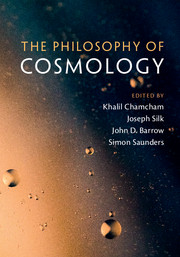Book contents
- Frontmatter
- Contents
- List of Contributors
- Preface
- Acknowledgments
- Part I Issues in the Philosophy of Cosmology
- Part II Structures in the Universe and the Structure of Modern Cosmology
- Part III Foundations of Cosmology: Gravity and the Quantum
- Part IV Quantum Foundations and Quantum Gravity
- Part V Methodological and Philosophical Issues
- Index
Preface
Published online by Cambridge University Press: 18 April 2017
- Frontmatter
- Contents
- List of Contributors
- Preface
- Acknowledgments
- Part I Issues in the Philosophy of Cosmology
- Part II Structures in the Universe and the Structure of Modern Cosmology
- Part III Foundations of Cosmology: Gravity and the Quantum
- Part IV Quantum Foundations and Quantum Gravity
- Part V Methodological and Philosophical Issues
- Index
Summary
Cosmology is the unifying discipline par excellence, combining theories of gravity, thermodynamics, and quantum field theory with theories of structure formation, nuclear physics, and condensed matter physics. Its observational tools include the most intricate and expensive scientific experiments ever devised, from large-scale interferometry, highenergy particle accelerators, and deep-sea neutrino detectors, to space-based observatories such as Hubble, Wilkinson microwave anisotropy probe (WMAP) and Planck. The recent and stunning detection of massive gravitational encounters between black holes by means of gravitational waves is only one of several windows that have recently been opened into the study of distant and exotic objects, and to ever-earlier epochs of the universe.
Cosmology is in a golden age of discovery, the likes of which have rarely been seen in the physical sciences. Theory has hardly kept up, but its bringing together of the fundamental theories of physics is also historic in its vitality. It draws them together in ways that put pressure on each: whether because, as in quantum mechanics, cosmology is an application in which there is no ‘external observer’; or because, as with the standard model of particle physics and general relativity, there is tension between their basic principles; or because, as in statistical mechanics, it highlights the extraordinary importance of the initial conditions of the universe for local physics. Add to these components the existing foundational problems of each discipline even in non-cosmological settings: the measurement problem in quantum mechanics, the ‘naturalness’ problem of the Higgs mass and the cosmological constant or ‘dark energy’ (so-called ‘fine-tuning’ problems), and the information-loss paradox of black-hole physics. The result is a heady brew – and this is not even to mention the enigma that is dark matter, making up the bulk of the gravitating matter of the universe, its nature still unknown.
What place, in this perfect storm, for philosophy? Some see none: ‘philosophy is dead’, according to Stephen Hawking, and needs no engagement from scientists. And indeed, where philosophers of physics have made inroads on conceptual questions in physics, they have tended to focus on cleanly defined theories treated in isolation. Synthetic theories, in complex applications, are messy and ill suited to rigorous analysis, axiomatisation, or regimentation by other means – the standard tools of philosophy.
- Type
- Chapter
- Information
- The Philosophy of Cosmology , pp. x - xiPublisher: Cambridge University PressPrint publication year: 2017



